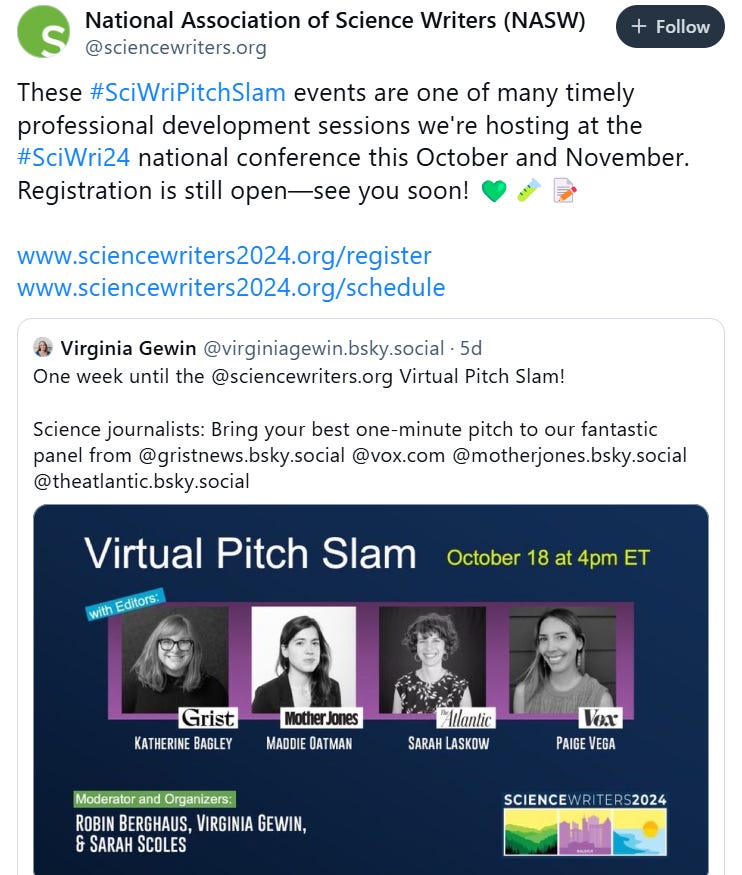✍️Science Writing News Roundup #214
From Scientist to Storyteller: Navigating a Career in Science Journalism | ft. Jonathan Wozen.
Welcome! You are reading the Science Writing News Roundup, a newsletter for science writers. You can also read this edition online. Did someone forward you this newsletter? Sign up here.
📻Resources
Insights and Practical Considerations for Communicating Basic Science. This report synthesizes the main ideas that emerged in discussions over a two-day workshop hosted by SciPEP that brought together science communication trainers, scholars, and other experts with the goal of deepening their understanding of the needs and opportunities of basic science communication training.
6 free resources to supercharge your freelance journalism. Whether you're trying to figure out what to charge for an article, seeking funding for an investigative project or improving your workflow to save time, there are many free resources that can make your freelance life easier.
What journalists should know before diving into drug investigations. Investigative journalists Jeanne Lenzer and Shannon Brownlee uncovered a trove of information about the recently approved Alzheimer’s drug donanemab, (brand name Kisunla).
Launch Your Science Blog: Share Your Expertise with the World. Learn how to become a trusted science blogger and empower your audience with your research.
👩💻News
Berggruen Prize Essay Competition Announces Inaugural Winners. It’s Time To Give Up Hope For A Better Climate & Get Heroic, by Pamela Swanigan, is premised on the assumption that it is too late to avert the impending climate disaster. It argues that for humanity’s fight against climate change to gain real momentum, we need to find the selfless courage that comes when our time is inevitably nigh. It’s time to move toward a rhetoric of heroism & courage, even in the face of defeat.
Mongabay announces the fifth cohort of the Y. Eva Tan Conservation Reporting Fellowship Program, welcoming three distinguished early-career journalists: Angana Chakrabarti, Keita Fanta Mabo and Waqas Alam Angaria bring crucial perspectives to the conversation around biodiversity, conservation and environmental degradation.
Partner Message
Introducing Beakers & Chips: Earlier this year, former SynBioBeta editor Kevin Costa and CMO/brand builder Jack Gold teamed up to launch Beakers & Chips, a brand marketing studio on a mission to help science and tech startups build powerful brands and compelling narratives without the overhead of a full marketing team. They will draw on their experiences taking Zymergen to a $580mm IPO and transforming Absci into a pharma market leader to help innovators achieve their true market potential. If you know any startups ready to make their mark, please spread the word! Visit https://beakersandchips.com/ or send an email to info@beakersandchips.com to learn more.
📒Articles
Readers deserve better from popular science books. There is a dirty secret in publishing: most popular science books aren't fact-checked. This needs to change, says Michael Marshall.
We need clarity about the deals between AI companies and news publishers. Here’s why. “What might be good for the parties involved isn’t necessarily beneficial to either industry, let alone society at large,” argues Felix Simon.
Good health reporting considers animal welfare: Understanding animal well-being can transform a story and reveal deeper truths.
Erica Berry Examines Fear Through Personal and Natural History in Wolfish. In a conversation with Kate Fishman, Berry spoke about using memoir to avoid the pitfalls of anthropomorphizing other creatures, her open-ended approach to interviewing, and how she found her own angle on an animal that gets a lot of attention.
New Survey Finds Journalism Layoffs Most Harmed Women, Journalists of Color and Younger Professionals. The IIJ Foundation survey of journalists found that layoffs disproportionately impacted women, people of color, and younger professionals, the first report to capture a comprehensive picture of laid off journalists’ experiences.
More articles👉Bonus content for monthly supporters.
✏️Opportunities
The Wellcome Collection Non-Fiction Awards aims to find and support writers from underrepresented groups, who have a big idea for a non-fiction book for general readers, that engages with the themes of health and being human. The Awards will support 6 writers in 2025.
The Complex Systems Summer Journalism Fellowship is a prestigious five-week residential and immersive program that offers two accomplished journalists the opportunity to explore complex systems science more deeply. Eligible candidates must have demonstrated interest in reporting on topics related to complex systems. Fellows receive a generous stipend for the duration of the Fellowship, including travel reimbursement.
Call for proposals: Cover COP29 from an African Lens. African journalists will have the opportunity to cover the 29th UN Conference of the Parties on Climate Change (COP29) virtually from their respective home countries. Mongabay will fund the production of articles, podcasts, and videos created by the journalists during the COP29 period in Baku.
More opportunities and calls for pitches 👉Bonus content for monthly supporters.
📼Videos
From Scientist to Storyteller: Navigating a Career in Science Journalism | ft. Jonathan Wozen
How to use ChatGPT and other generative AI tools in your newsroom.
More videos 👉Bonus content for monthly supporters.
🎟️Events
ScienceWriters2024 (October 17-18, November 8-11, 2024)
Science Journalism Forum (October 28-31, 2024)
2024 Outrider Nuclear Reporting Summit (December 5-6, 2024). The Outrider Nuclear Reporting Summit will gather media practitioners, national security experts, policymakers, and scientists. This free, two-day conference and training will focus on how nuclear weapons issues intersect with artificial intelligence, community health, climate change, local economies, and the environment.
More events👉Bonus content for monthly supporters.
📨Jobs
Thanks for reading! Subscribe for free to receive the next post in your inbox:
Worried you missed something? See previous posts here. What would you like to see in the newsletter? Please send me your suggestions: sciencewriting@substack.com




